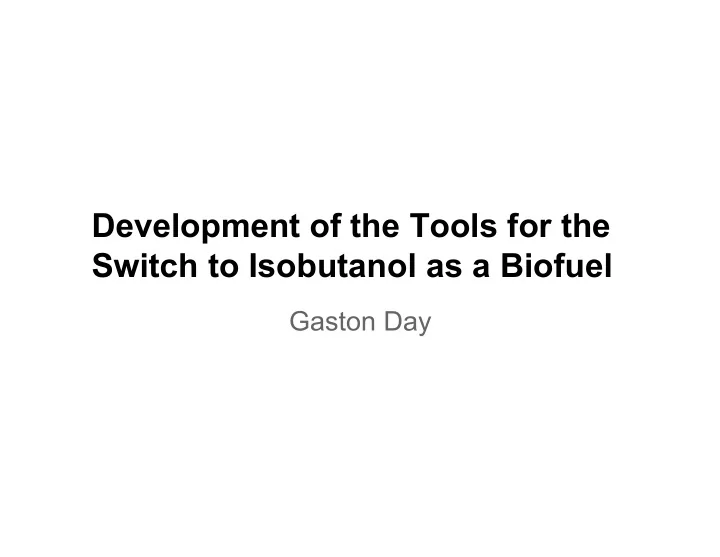

Development of the Tools for the Switch to Isobutanol as a Biofuel Gaston Day
Introduction Set story - 1. Why do we need to shift 2. Can’t immediately shift to biofuels 3. What’s needed to shift 1. parts missing (efficient production, infrastructure, vehicles, etc) 4. Even AFTER switch 1. leftovers from fossil fuel use
Problems with System -why we need biofuels
What’s needed to shift parts missing
Even after switch leftovers from fossil fuel switch
Biofuels Background - Environmental concerns - Prevent dependence on the non-renewable resource petroleum
Potential Biofuels - Algae - Ethanol - Isobutanol Able to be swapped into current infrastructure - Isobutanol - Isobutanol and ethanol make best biofuels since they can be swapped into existing structures. Butanol does not mix with water which means you do not have to distill it like ethanol. This leads to a cheaper and easier separation process.
Isobutanol Production
Why do we need a resistant strain
Resistant Strains Procedure -Grow E. coli overnight in LB broth in a certain concentration of alcohol -Increase alcohol concentration each time the control growth is equivalent to the experimental strain growth
Resulting Strains of E. Coli - Strains of E. Coli resistant to isobutanol created - Resistant to 1.5% Isobutanol - Still in development
Isobutanol Resistance l
Biofuels Procedure (cont'd) - PCR to amplify and ligate GlmZ, GlmY, and IlvM
Biofuels Results Gel showing our working GlmY construct. Wells are as follows: 1.Ladder 2.Control 3.GlmY 4.GlmY
Cadmium Project
Cadmium Detector Background - Surrounding areas of Duke Power’s Buck Steam Station affected by millions of tons of coal ash containing cadmium. - Signs of cadmium poisoning: flu-like symptoms, kidney damage, fragile bones, possible death
Cadmium Project Summary - Created heavy metal detectors in 2012 and focused on the cadmium detector in 2013. - Worked to increase sensitivity of detector. - This year, completed addition of 2007 Cambridge team’s sensitivity tuners. - Increased sensitivity of construct four-fold
Cadmium Model
Cadmium Project Details Put animation here
Cadmium Procedure -Performed sensitivity tests by adding 6 concentrations (0-100 mM) of cadmium chloride. -Grew overnight at 37 C in a shaking incubator -Resuspended culture 1 mL 1x PBS. -Read the OD600 and the fluorescence of the GFP using Vernier SpectroVis plus and LoggerPro software
Cadmium Results
Safety Concern 1: Alcohol resistance -Isopropanol -Ethanol -Hand Sanitizer -Lab cleaning procedures
Lab Procedures -Changed cleaning methods -10% bleach as alternate cleaner -Isobutanol resistance is independent from ethanol resistance
Commercial procedures -Built in kill switch -Hand sanitizer -Isopropanol -Ethanol
Cadmium Conclusion - Improved in sensitivity four-fold from detector created by 2012 team. -Used Cambridge 2007 team’s sensitivity tuners.
Biofuels Conclusion - GlmY - We were successfully able to clone the gene GlmY - Deals with isobutanol resistance - Natural Resistance - Through artificial selection, we increased the resistance of E. Coli to 1.5% concentration of isobutanol, a significant step in the right direction.
Future Actions -For biofuels: GlmY with constitutive promoter and add to the construct? Also something with GlmZ -Cadmium: Kill switch, commercialization, other detectors, RFP so don’t need special devices to read florescence.
Sponsors -Sign Smart -Gaston Day School -New England Biolabs Inc. -Sandra and Bill Hall
Recommend
More recommend